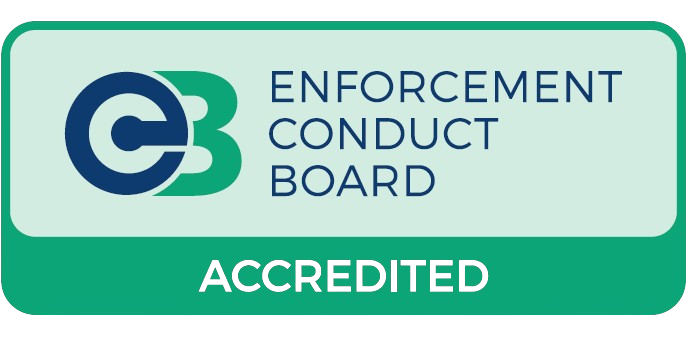Legal Services | Process Serving | Service of Documents
Process Serving
Our national network of Certificated Enforcement Agents (Bailiffs) can serve legal documents on your behalf.
With a knowledgeable team, we support solicitors and legal professionals with reliable, compliant process serving across England and Wales.

Professional Process Serving Services
Are you in need of professional assistance with process serving? Look no further. Our service is designed to provide fast, confidential, and legally compliant solutions tailored to your needs.
What is Process Serving?
Process serving is the formal delivery of legal documents—such as divorce petitions, bankruptcy orders, Section 8 and 21 notices, and non-molestation orders—to individuals involved in legal proceedings. These documents notify recipients of their rights and obligations under the law.
Our Process Serving Service
Our team of experienced enforcement agents ensures your legal documents are served promptly and professionally, fully in line with legal protocols.
Why Choose Us?
- Experience: Years of hands-on experience in legal document service.
- Reliability: Trusted to meet deadlines and deliver professional service.
- Confidentiality: Your documents and privacy are handled with utmost care.
- Tailored Approach: Services adapted to your specific requirements, including multi-location coordination.
Our Process
- Initial Consultation: We review your requirements and gather all relevant information.
- Service of Process: We serve the documents promptly to the recipient.
- Proof of Service: We provide detailed documentation (e.g., N215, FL401) as needed.
- Follow-Up: We keep you informed every step of the way.
What Can We Serve?

Get In Touch Today
Don’t let unprofessional service delay your case. Trust UK Bailiffs for a dependable and discreet solution.
Type of documents we can serve - additional information
Court Orders
At UK Bailiffs, our assistance in the process serving of court orders encompasses a comprehensive, professional approach to ensure that all legal requirements are met, and that the serving process is conducted efficiently and discreetly. Here's how we assist:
1. Initial Assessment:
Document Review: We begin by reviewing the court order to understand its nature, the parties involved, and any specific instructions or time limits for service. This includes:
Identifying the precise location where the order should be served.
Understanding any special conditions for serving the order, like confidentiality or urgency.
Legal Strategy: We assess whether there are any particular strategies needed due to the respondent's known behavior or previous attempts at service.
2. Service Planning:
Service Method Selection: Based on the order and circumstances, we decide on the best method of service:
Personal Service: The most direct method where we attempt to hand the order to the respondent. This ensures immediate acknowledgment of the order.
Substitute Service: If personal service fails or is impractical, we might serve by leaving the order at the respondent's last known address or place of business with someone likely to pass it on.
Service by Post: First-class or recorded delivery for when personal service isn't possible or as an additional method for proof of service.
Electronic Service: If agreed upon by all parties or allowed by the court, service can occur via email or other electronic means.
Timing: We schedule the service to comply with any deadlines set by the court or to take advantage of times when the respondent is likely to be at the service location.
3. Execution of Service:
Personal Delivery:
Our servers visit the address, attempt to meet the respondent, and serve the document directly.
If the respondent is not available, we might leave it with a person at that residence or business who appears to be over the age of 18, or in a prominent place where the respondent is likely to find it.
Post and Electronic Means:
For postal service, we document the mailing with necessary proofs.
Electronic service is done with confirmation of delivery.
4. Documentation and Reporting:
Certificate of Service: After serving, we issue a Certificate of Service, which includes:
The method of service.
Date, time, and location of service.
Details of the person served or where the document was left.
Affidavit of Service: For court proceedings, we can provide an affidavit sworn by the server detailing the service process.
Client Update: We inform clients immediately upon successful service or if there are issues, providing them with all documentation needed for legal purposes.
5. Follow-Up:
Verification: We verify with the client that all aspects of the service have been completed to their satisfaction.
Additional Actions: If there's a need for further intervention or if the respondent attempts to evade service, we can organize additional attempts or propose alternative legal strategies.
6. Legal and Ethical Compliance:
Confidentiality: Throughout, we maintain the confidentiality of the process and the parties involved.
Legal Standards: All our activities comply with current legal standards and court rules for serving court orders, ensuring no step is taken outside of legal boundaries.
Safety: In cases where there might be a risk of confrontation or violence, we take necessary precautions, sometimes coordinating with law enforcement.
By adhering to these steps, UK Bailiffs ensures that court orders are served in a manner that is legally sound, timely, and effective, supporting the enforcement of court decisions while maintaining professionalism and discretion.
No file chosen
Non- Molestation Orders
In the UK, the service of non-molestation orders is a critical step in ensuring the legal protection of individuals from domestic abuse. Here are the key details regarding how these orders are served:
Personal Service: Typically, non-molestation orders must be served personally on the respondent. This means that the order is physically handed to the person against whom the order is made. This ensures that they are aware of the order's existence and its terms. Personal service is usually carried out by a court officer, process server, or sometimes by the police if deemed necessary.
Ex Parte Orders: If an order is made without notice (ex parte), which means the respondent is not informed of the hearing where the order is granted, it's especially important that service occurs promptly to prevent any unintentional breaches by the respondent.
Notice: The respondent needs to be notified of the order. This is often done by providing them with a copy of the order itself, which includes details about what behaviors are prohibited and the consequences of breaching the order.
Proof of Service: After serving the order, a statement of service or proof of service document is usually required, detailing when and how the order was served. This document confirms that the respondent has been officially informed of the order.
Role of the Applicant: Generally, it is not appropriate for the applicant themselves or their close associates to serve the order to avoid any potential conflict or safety issues. Hence, professional services are used.
Breach Implications: Once served, the respondent is legally bound by the terms of the order. Breaching a non-molestation order after it has been served is a criminal offence, potentially leading to arrest, charges, and penalties like fines or imprisonment.
Alternative Service Methods: In some cases, if personal service is not possible (e.g., the respondent is evading service), the court might allow other methods like posting through the respondent's letterbox, electronic means if legally permissible, or substituted service through another person. However, this must be authorized by the court, and it's noted on the order if an alternative method is used.
Timeframe: The service should be executed as soon as possible after the order is made. This urgency is due to the protective nature of these orders.
The process ensures that the respondent is fully aware of their obligations under the law, providing the victim with necessary legal protection against further abuse or harassment. For further details or in cases involving specifics, it's advisable to consult with legal professionals or refer to the guidance provided by Family Courts or legal advice services.
Section 8 and 21 Notices
At UK Bailiffs, serving Section 8 and Section 21 notices involves the following streamlined process:
Section 21 Notices:
Service Methods:
Personal Delivery: Our agents can visit the property and hand the notice directly to the tenant or leave it where it's likely to be found by the tenant if they're not available.
Post: If instructed, we'll use recorded or first-class post, keeping track of the mailing for proof of service.
Electronic Service: If permissible under the tenancy agreement, we can send via email, ensuring we have an acknowledgment or read receipt.
Documentation: We provide you with a certificate of service detailing the method, date, and time of service.
Section 8 Notices:
Service Execution:
In-Person: Similar to Section 21, our team can serve the notice personally or at the property.
By Post: We use tracked or recorded delivery services for postal service.
Email: When agreed upon, electronic service is facilitated with confirmation.
Records: A detailed record of service is kept, including who was served, how, and when.
Additional Services:
Follow-Up: We can offer follow-up services to confirm receipt or deal with any tenant queries or issues arising from the notice.
Legal Compliance: Our understanding of current laws ensures that notices are served in compliance with legal requirements, like all prerequisites are met before serving, and notices are served within the legally required time frames.
Court Documentation: If the tenant does not comply, we can assist with the preparation of court documents, ensuring that proof of service is properly presented in legal proceedings.
UK Bailiffs focuses on professionalism, ensuring notices are served promptly and correctly, thereby minimizing the risk of legal challenges due to improper service.
No file chosen
Statutory Demand
Serving a statutory demand at UK Bailiffs involves a systematic approach to ensure it is done effectively and legally, considering the implications of such a document in insolvency proceedings. Here's how we would proceed:
1. Verification of Details:
Before service, we confirm all details on the statutory demand form are accurate, including the debtor's name, address, and the amount owed.
2. Choice of Service Method:
Personal Service: This is the preferred method. Our process servers will attempt to deliver the statutory demand directly to the debtor. If the debtor is an individual, it's served personally. For a company, it would be left at the registered office or handed to an officer of the company.
Registered Post: If personal service is not possible, we might use registered post as a secondary method. This option is used when the debtor cannot be found at their known address or is evading service, though personal service remains the ideal method due to its proof of receipt.
Alternative Methods: In some cases, if personal service fails, we might discuss with legal counsel to explore other acceptable service methods like email or delivering to a known place of business, but this would need court approval as statutory demands generally require personal service.
3. Execution of Service:
Personal Delivery: Our process server will visit the debtor's address, attempt to serve the demand in person, and if unsuccessful, leave it in a manner that it would reasonably come to the debtor's attention (e.g., sliding it under the door or leaving with someone who appears to reside there).
Documentation: We document the attempt and success of service, noting the date, time, and method. If served personally, the server might ask for an acknowledgment of receipt, though this isn't mandatory.
4. Proof of Service:
After service, we provide a Certificate of Service, which is crucial if further legal action like a bankruptcy or winding-up petition follows. This certificate details:
The date and time of service
The method of service
If applicable, the name of the person who accepted the document on behalf of the debtor
5. Follow-Up:
We keep records of all attempts at service and can offer follow-up services if there's no acknowledgment from the debtor. This might involve additional attempts at service or notifying the client if there's evidence that the demand was evaded or ignored.
6. Legal Considerations:
We ensure compliance with the Insolvency Act 1986 and the relevant Insolvency Rules, which dictate the serving of statutory demands. For instance, the demand must be served on the debtor or in the case of a company, at its registered office, and the debtor must be given an opportunity to comply with or challenge the demand within the 21-day period.
By following these steps, UK Bailiffs ensures that statutory demands are served in a manner that is legally binding and that maximizes the chances of a successful outcome in subsequent insolvency proceedings if the demand is not met.
Section 146 Law of Property Act
At UK Bailiffs, serving a Section 146 Notice under the Law of Property Act 1925 involves a meticulous process to ensure that all legal requirements are met, particularly since this notice is typically the precursor to lease forfeiture proceedings. Here’s how we would serve such a notice:
**1. Review and Preparation:
Before serving, we review the notice to ensure it complies with section 146 of the Law of Property Act 1925. This includes:
Clearly specifying the breach in question.
If the breach is remediable, requiring the tenant to remedy it.
Requiring the tenant to make reasonable compensation in money for the breach.
**2. Method of Service:
Personal Service: This is the most common and legally secure method. Our process server will:
Attempt to hand-deliver the notice directly to the tenant or leaseholder.
If personal delivery isn't possible because the tenant isn’t at the property, the notice can be left in a prominent place at the property, like the tenant's last known address or the property in question, where it's likely to come to the attention of the tenant.
By Post: If personal service isn't achievable, or as an additional method:
We can use first-class post or recorded delivery. The date of service in this case is deemed to be two working days after posting, unless proven otherwise.
If the post returns undelivered, this might necessitate revisiting the personal service approach or considering alternative legal service methods.
Email or Other Electronic Means: If agreed upon in the lease or by prior communication, we can serve via email, though this is less common for Section 146 notices due to the serious implications of not serving properly.
**3. Documentation:
Certificate of Service: After serving, we prepare a Certificate of Service which details:
The date, time, and method of service.
The name of the individual served or where and how the notice was left if not personally served.
**4. Follow-Up:
We can provide follow-up services to ensure the tenant has received the notice or to handle any inquiries or disputes that might arise from the serving of the notice. This might include additional attempts at service or addressing any counter-notices served by the tenant.
**5. Legal Compliance:
We ensure that the notice period given for the tenant to remedy the breach is reasonable, which can depend on the nature of the breach.
If the tenant serves a counter-notice, we advise our clients on how to proceed, which might involve court proceedings if the breach isn't remedied.
Letter Before Action (LBA and PAP)
At UK Bailiffs, our process for serving a Letter Before Action (LBA) and adhering to the Pre-Action Protocol (PAP) involves several steps to ensure that all legal requirements are met, disputes are resolved as early as possible, and both parties are treated fairly. Here’s how we handle this:
Letter Before Action (LBA):
**1. Drafting the LBA:
We ensure the letter is clear, concise, and includes:
The details of the claim.
The amount of money owed if it's a debt claim.
A clear statement that legal action will be taken if the matter isn't resolved.
Details on how to respond, including a deadline (usually 14 days but can vary).
Information about any interest that will accrue or costs that might be added if the debt isn’t paid.
**2. Service of LBA:
Personal Delivery: If feasible, we attempt to deliver the LBA personally to ensure immediate receipt.
By Post: More commonly, the LBA is sent via first-class post or recorded delivery. This method provides proof of postage and, ideally, proof of receipt.
Electronic Service: If agreed upon beforehand, or if it’s a common practice in the industry, we might serve via email, ensuring we have confirmation of receipt.
**3. Documentation:
We keep records of the LBA, including the method of service and date sent.
Pre-Action Protocol (PAP):
**1. Understanding the Protocol:
Before initiating court proceedings, we ensure compliance with the relevant Pre-Action Protocol which encourages:
Exchange of sufficient information between parties to resolve the matter without litigation.
Exploring alternative dispute resolution (ADR) like mediation.
**2. Protocol Steps:
Letter of Claim: This is essentially the LBA, providing detailed information about the claim.
Response: The debtor has a period (usually specified in the protocol or the LBA) to respond. Their response might include an admission of the claim, a denial, or a counter-offer.
Disclosure: Both parties might need to exchange documents or information relevant to the claim. We assist in gathering and sending this on behalf of our clients.
Negotiation: We facilitate discussions or negotiations between the parties. This might involve setting up mediation or discussing repayment plans.
Alternative Dispute Resolution (ADR): We encourage the use of ADR methods like mediation, which can save time and costs compared to court proceedings.
Pre-Action Conduct: Throughout, we ensure our actions align with the spirit of the PAP, which is to resolve disputes fairly and efficiently, avoiding unnecessary litigation.
**3. Service of Further Correspondence:
If negotiations fail, or further steps are required under the protocol, we serve any additional letters or documents following the same service methods as the LBA, ensuring they are delivered in a manner that allows for a response or acknowledgment.
**4. Documentation and Records:
All interactions, sent documents, responses, and outcomes are meticulously documented. This record-keeping is crucial for legal proceedings if they become necessary, showing that attempts at resolution were made in good faith.
**5. Court Proceedings if Necessary:
If the PAP steps do not resolve the issue and the debtor remains non-compliant, we assist with the preparation for court action, ensuring all procedural steps under the protocol have been followed, which can influence the court's view on case management and costs.
By following this structured process, UK Bailiffs helps ensure that all legal obligations are met, giving clients the best chance at resolving disputes before they escalate to court, while also preparing adequately for legal action if required.
No file chosen
Ask anything
Cease and Desist Orders
At UK Bailiffs, our process for assisting in serving Cease and Desist Orders involves several key steps to ensure that the service is carried out effectively, legally, and in a manner that maximizes the likelihood of compliance. Here's how we would handle this:
Preparation:
Review of the Order:
Before any service, we review the Cease and Desist Order to understand the specifics of what needs to be communicated, including:
The activities that must cease.
The deadlines or time frames specified for compliance.
Any conditions or requirements the recipient must adhere to.
Understanding Legal Implications:
We ensure that we are aware of the legal nuances, such as whether the document is an informal letter or a formal court order, as this affects the service requirements.
Service Methods:
Personal Service:
This is often the most effective method for Cease and Desist Orders due to its directness and proof of receipt. Our process servers will:
Attempt to deliver the order directly to the recipient or their legal representative if they are known.
If unable to serve personally, the order might be left in a place where it's likely to come to the recipient's attention, like their last known address or place of business.
By Post:
If personal service isn't possible, we can use:
First-Class Post or Recorded Delivery: This method ensures proof of postage. We can track the delivery, and it's assumed to be served two working days after posting unless there's evidence to the contrary.
Electronic Service:
If the recipient has agreed to electronic service or if it's legally permissible under the circumstances:
Email Service: We would send the order via email, keeping digital records of the transmission and ideally obtaining a receipt or delivery confirmation.
Documentation:
Certificate of Service:
After serving, we provide a Certificate of Service which includes:
The method of service used.
The date and time of service.
Details of who was served, or if left at a residence or business, where it was placed.
Any responses or acknowledgments from the recipient.
Affidavit or Declaration:
In some cases, especially if the matter escalates to court, we might prepare an affidavit or sworn declaration regarding the service process.
Follow-Up:
Confirmation of Receipt: Where possible, we confirm that the recipient has received the order, either through personal acknowledgment, postal tracking, or electronic read receipts.
Additional Attempts: If the initial service attempt fails, we can make several follow-up attempts. For personal service, this might involve visiting at different times or days to catch the recipient at home or work.
Reporting: We keep our clients informed about the status of the service, providing updates on attempts, successful service, or any issues encountered.
Legal Considerations:
Privacy and Confidentiality: We handle the process with discretion to protect the privacy of both parties involved.
Legal Compliance: We ensure that all actions taken during service comply with relevant laws, including data protection regulations when handling personal information.
Advice on Next Steps: If the recipient fails to comply with the order, we can advise on the next legal steps, potentially including court action to enforce the order or seek further remedies like an injunction.
Temporary Restraining Orders
At UK Bailiffs, our process for assisting in serving Temporary Restraining Orders (TROs) is structured to ensure immediate action, legal compliance, and effective communication. Here’s how we proceed:
Immediate Action:
Urgency Recognition:
TROs are time-sensitive by nature, often requiring service within a very short period after they are issued. We understand this urgency and prioritize these cases to act swiftly.
Preparation:
Review of the Order:
We carefully review the TRO to understand:
The specifics of what behaviors are to be restrained.
The time frame for when the order becomes effective.
Any additional conditions or requirements.
We identify all parties named in the order to ensure service to the correct individuals.
Legal Requirements:
We ensure we are fully aware of the legal protocols for serving TROs in England and Wales, including any specific court directives accompanying the order.
Service Methods:
Personal Service:
Given the urgency and the need for immediate effect:
Hand Delivery: Our process servers will attempt to deliver the TRO directly to the respondent. This ensures that the respondent is immediately aware of the order.
If the respondent is not available, we might leave it with someone at the respondent's address who seems to be over 18, or in a place where it's likely to be found by the respondent, like their known workplace or another place they frequent.
By Police or Court Bailiff Service:
For TROs, especially those involving domestic violence or immediate threats, service might be conducted by police or court bailiffs. We coordinate with these officials where necessary, offering support or additional information as required.
Alternative Methods:
If personal service proves impossible due to the respondent evading service:
We might seek court permission for substituted service, like posting in a prominent place or through another method that ensures the respondent has notice of the order.
Documentation:
Proof of Service:
After serving, we provide comprehensive documentation:
Certificate of Service: This details the method of service, the date, time, and location where service was affected, and who accepted the documents if not the respondent personally.
Affidavit or Statement: In cases where further legal action might be required, we can prepare an affidavit or a sworn statement about the service.
Follow-Up:
Confirmation:
We confirm with the client that service has been completed, providing them with all necessary documentation for their records or for court purposes.
Monitoring:
Where applicable, we might conduct follow-up to ensure the respondent has complied with the TRO, or to report back to the client or legal authorities about any issues or further actions needed.
Legal and Safety Considerations:
Legal Compliance:
All our actions are in strict compliance with legal standards, ensuring that the TRO is served in a manner that is legally binding and enforceable.
Safety Precautions:
In cases where there might be a risk of violence or further harassment, we take additional safety measures, potentially coordinating with law enforcement to ensure the safety of all involved parties during the service.
Confidentiality:
We maintain strict confidentiality throughout the process, protecting the privacy of both the applicant and the respondent.
By following this detailed process, UK Bailiffs ensures that Temporary Restraining Orders are served efficiently, effectively, and in full compliance with UK law, thereby providing immediate protection to those in need while maintaining the integrity of the legal process.
Divorce Paperwork
Serving Divorce Papers with UK Bailiffs
At UK Bailiffs, we understand that serving divorce papers can be a sensitive and complex process. Here’s how we ensure your documents are served efficiently, legally, and discreetly:
Step 1: Preparation
Gather Documents: We require the Divorce Petition, Acknowledgement of Service form, and Notice of Proceedings.
Client Information: Provide us with detailed information about the respondent, including their last known address, any aliases, and recent photographs if available.
Step 2: Locating the Respondent
If the respondent's location is uncertain or they are avoiding service, our experienced process servers use various methods to locate them, ensuring we can serve the papers.
Step 3: Attempting Service
Personal Service: Our primary method is direct, personal service where our server hands the papers directly to the respondent. We make multiple attempts at different times to increase the chance of a successful service.
Alternative Methods: If personal service isn't possible:
We might leave the papers with someone over the age of 16 at the respondent's home or workplace, ensuring they agree to pass them on.
In some cases, we may post documents through the letterbox if approved by the court.
Step 4: Documenting Service
Proof of Service: After service, we provide you with a Statement of Service or Affidavit of Service, which includes:
Date, time, and place of service.
Method of service.
Name of the person served or left with.
Step 5: Handling Difficult Cases
Failed Service: If we can't serve the papers directly:
We compile a detailed Statement of Attempted Service, documenting all efforts to locate and serve the respondent.
We can advise on or assist with applications for alternative service methods, deemed service, or dispensed service, depending on the situation.
Step 6: Reporting
Client Updates: You will receive regular updates on our service attempts, with immediate notification once service is completed.
Operational Standards
Legal Compliance: All our activities comply with the Civil Procedure Rules and respect the privacy and rights of all involved parties.
Discretion: We approach service with the utmost discretion, understanding the sensitive nature of divorce proceedings.
Efficiency: Our local knowledge and experienced servers ensure we provide a swift and effective service.





